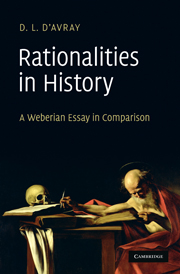Book contents
- Frontmatter
- Contents
- Preface and acknowledgements
- Introduction
- 1 Universal and specific rationalities: theories
- 2 The structure of values and convictions
- 3 Dynamics of values and convictions
- 4 The instrumental–conviction rationality interface
- 5 Formal rationality
- 6 The formal–substantive interface
- Conclusions
- Appendix: rationalities in a case before the Congregation of the Council
- Bibliography
- Index
Introduction
Published online by Cambridge University Press: 05 June 2012
- Frontmatter
- Contents
- Preface and acknowledgements
- Introduction
- 1 Universal and specific rationalities: theories
- 2 The structure of values and convictions
- 3 Dynamics of values and convictions
- 4 The instrumental–conviction rationality interface
- 5 Formal rationality
- 6 The formal–substantive interface
- Conclusions
- Appendix: rationalities in a case before the Congregation of the Council
- Bibliography
- Index
Summary
Scope of the book
The aim of the present work is to develop a concept of value rationality that helps explain why people hold on doggedly to their convictions; to balance this with observations on how values nonetheless do change; to bring out the interdependence of instrumental and value rationality; to discredit special association of formal rationality with ‘modernity’; and to show how value-driven instrumental reasoning draws lines between formal and substantive legal rationality. These concepts of rationality represent ways of thinking which are virtually never found in a ‘pure’ form in history but which one may distinguish analytically, not for the sake of classification as an end in itself, but to explain their mutual relations.
The book is aimed at both social scientists and historians, from intellectually ambitious undergraduates upwards. Historians may wonder if they need so much social theory. Those historians who persevere into the second third of the book should find that the theory pulls its empirical weight; and in some parts of the last third of the book the concepts are put to work on unpublished and unstudied documents generated by the institution established to implement the Council of Trent. Gluttons for punishment with an appetite for more concentrated applications of the concepts may turn to the sister volume on the rationalities of medieval religion. The medieval volume should be seen in the comparative perspective that the present book tries to provide.
- Type
- Chapter
- Information
- Rationalities in HistoryA Weberian Essay in Comparison, pp. 1 - 28Publisher: Cambridge University PressPrint publication year: 2010



